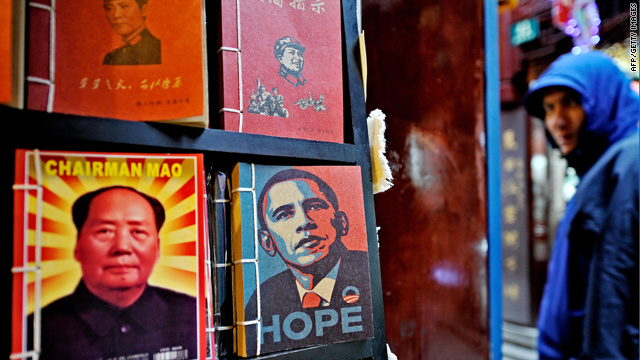The complexities of U.S.-China ties

- President Obama meets with the Dalai Lama at the White House on Thursday
- China is angry over the Dalai Lama's visit; it opposes his views
- Expert: Neither China nor the United States can afford a major falling out
- China is the largest export market for the United States, expert says
Washington (CNN) -- President Obama met with fellow Nobel Prize winner the Dalai Lama at the White House on Thursday, amid concerns from China over the visit.
Because of the diplomatic sensitivities over the tension between China and the exiled Tibetan spiritual leader, every aspect has been choreographed and worked out in advance. For one, the president met with the Dalai Lama in the Map Room, which is part of the residence at the White House, and not in the Oval Office.
The reason: Beijing regards the Dalai Lama as a dangerous "separatist," a politician who wishes to sever Tibet from China.
Ahead of a summit last year with Chinese President Hu Jintao, Obama persuaded Tibetan representatives then to postpone the meeting with the Dalai Lama.
 Video: Objections to Dalai Lama visit
Video: Objections to Dalai Lama visit
Former presidents Bill Clinton and George W. Bush also met the Dalai Lama, meetings that also prompted strong protests from Beijing.
So why should the Obama administration be concerned about China's discontent?
"U.S. exports are zooming to China. It's the largest export market for the U.S. -- largest growing export market for the U.S. It grew 65 percent this past year alone," said Douglas Paal of the Carnegie Endowment for International Peace.
In spite of disagreements about the Dalai Lama and U.S. arms sales to Taiwan, neither China nor the United States, Paal says, can afford a major falling out.
The polls seemingly back that up. Nearly three-quarters of all Americans think Tibet should be an independent country, according to a national CNN/Opinion Research Corp. poll.
But the survey, released last week, also indicates that most Americans think it is more important to maintain good relations with China than to take a stand on Tibet.
The survey's overall sampling error is plus or minus 3 percentage points.
There's often the impression that the United States needs China more than China needs the United States. What's the true story?
"Well, we both need each other," Paal said. "We need each other for a number of international security issues, to deal with the global climate crisis, to deal with the global financial crisis."
Victor Zhikai Gao, a former employee of China's Ministry of Foreign Affairs who served as interpreter for senior Chinese officials, has said relations between the two are vital.
"It is crucially important for China and the United States to better understand each other and to provide incentives to each other, so that they can increase cooperation for the benefit of the overall peace and stability in the world," he wrote in a CNN.com commentary.
Paal said that Americans' perception of China as a poor country is simply untrue.
While China was very poor and under stress, suffering through civil wars and foreign invasions, a lot has changed.
Paal studied China for decades as investment banker, diplomat, CIA expert and presidential adviser. China, he said, is now a major international player, holding more than $1 trillion of U.S. debt and a burgeoning economy.
"China doesn't want to make cheap things. It wants to make better things," he said. "And if you have an iPhone or if you have an Apple computer, that came from China. It didn't come from the United States."
"The Chinese are always looking at America to see whether we're gaining strength or losing strength," Paal said. "And Americans should ask themselves: Are we at home taking care of our economy and moving ourselves forward so that China will see us as a source of strength and not as a potential weak party to deal with and put pressure on?"
If that's done, Paal said, everything else becomes easy.
CNN's Ed Hornick contributed to this report.
